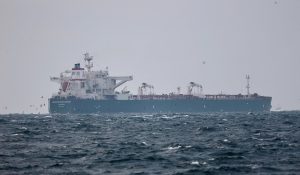By Renee Maltezou and Jonathan Saul
ATHENS, June 19 (Reuters) – When a missile fired by Yemen’s Houthi Islamists landed near his ship in the Red Sea, Costas Rassias vowed to stop sailing through the perilous waters.
“I froze,” said the Greek 34-year-old second class marine engineer, describing the close call. “I weighed what was more important – my life, or a better income?”
As attacks on merchant ships by the Iran-backed Houthis persist, traumatised seafarers are refusing to sail through the Red Sea, according to interviews with more than 15 crew members and shipping industry officials.
That’s another staffing headache for an industry already facing a shortage of seafarers worldwide, with ranks having shrunk after COVID kept seafarers on board for months and the war in Ukraine posed dangers in the Black Sea.
Shipping Industry Urges UN to Protect Vessels After Iran Seizure
“Seafarers are less and less keen to willingly sail through that region and it is becoming a bigger challenge now,” an industry source with knowledge of the crisis said.
Houthis first launched drone and missile strikes in the key waterway in November in what they say is solidarity with Palestinian militants in Gaza. In over 70 attacks, they have sunk one vessel, seized another and killed at least three seafarers.
Container ship sailings through the Red Sea dropped 78% in May compared with a year ago, analysis from logistics platform project44 shows, as companies choose to go around Africa, raising costs and extending voyages.
“My answer is very clear: No,” said Rassias, when asked if he would go back again. He is a member of Greece’s marine engineers’ union PEMEN.
“We urge our members not to give in to pressure, to put their safety and lives first and demand not to work in war zones at any cost.”
US Naval Forces Rescue Crew From Greek-Owned Ship Struck by Houthis in Red Sea
ROCKETS FLY
Charles Watkins, CEO and clinical psychologist at Mental Health Support Solutions, has met 40 seafarers from two ships that sailed through the Red Sea. Many have experienced trauma and some are considering leaving the trade.
“There can be sleep disturbances, nightmares, they can be easily startled, they can be stressed, they can develop a sudden urge not to eat anything anymore,” Watkins said.
Most ships have deployed armed guards on board to help defend crew during potential attacks, but crew themselves are rarely trained or equipped for conflict.
“The majority of merchant ship crews have no military training whatsoever,” said John Pavlopoulos, head of Sea Guardian, whose armed guards have made thousands of crossings through the area. “The slightest explosion disconcerts them, stresses them out.”
Boris Basenko, Ukrainian captain of the Greek-owned bulk carrier Zografia which was struck by a rocket this year near Yemen, said he doubts he will sail again through the region.
“Rockets fly into my home city every day but I was caught by a rocket a few hundred miles away” from Ukraine, he said. “Almost everyone from my crew at that time did not want to return to the Red Sea.”

Johnrhez Balboa, a 26-year-old engine cadet from the Philippines on his first nine-month stint at sea, was aboard the first vessel to pass through the Red Sea last December after another ship, the Galaxy Leader, was hijacked. His crew maintained a “pirate watch”, scanning the water for hijackers.
“We were afraid and anxious,” he said “Guarding our ship was scary.”
Mariners have support if they choose not to go, said John Canias, head of maritime operations with the International Transport Workers’ Federation (ITF), the leading seafarer’s union.
The nearly 360,000 seafarers covered by an ITF agreement worldwide have the contractual right to refuse to sail in designated war zones and demand repatriation at the shipowner’s expense. In April, one such zone in the Red Sea, known as a “warlike operations area”, was expanded at ITF’s request, Canias said.
“Many shipowners are now more reluctant to sail through the area as they simply don’t want to put seafarers’ lives on the line,” he said.
Islamic Republic-Backed Houthis Detain an ‘American-Israeli Spy Cell’
GROWING DEMAND
Over 80% of global trade is shipped by sea and an estimated 1.8 million seafarers service ships, with growing shortages of qualified mariners.
Some 18,000 additional officers would need to join each year to meet demand, according to the most recent seafarer workforce report published in 2021. Thousands of higher level officers are needed to service the 80,000-strong ocean-going fleet.
Some Greek captains have already requested to be transferred to other vessels to avoid the Red Sea, a union official said. At least four Greek companies have in recent months decided not to cross the area, company officials said.
“We don’t like to profit off the pain of others. We won’t send our ships there,” said George Logothetis, executive chairman of privately owned U.S.-headquartered Libra Group.
Other companies are reviewing each case separately, weighing the risks for crews and vessels.
Rene Kofod-Olsen, CEO of V.Group, one of the world’s biggest ship management and crewing companies, said their managed fleet’s crossings have declined since the beginning of the conflict.
He said in the instances where their ship owner clients have opted to sail through, “we give our seafarers the opportunity to not proceed and we can change crew.”
(Reporting by Renee Maltezou and Jonathan Saul; Additional reporting by Neil Jerome Morales in Manila and Yannis Souliotis in Athens Editing by Edward McAllister and Peter Graff)













